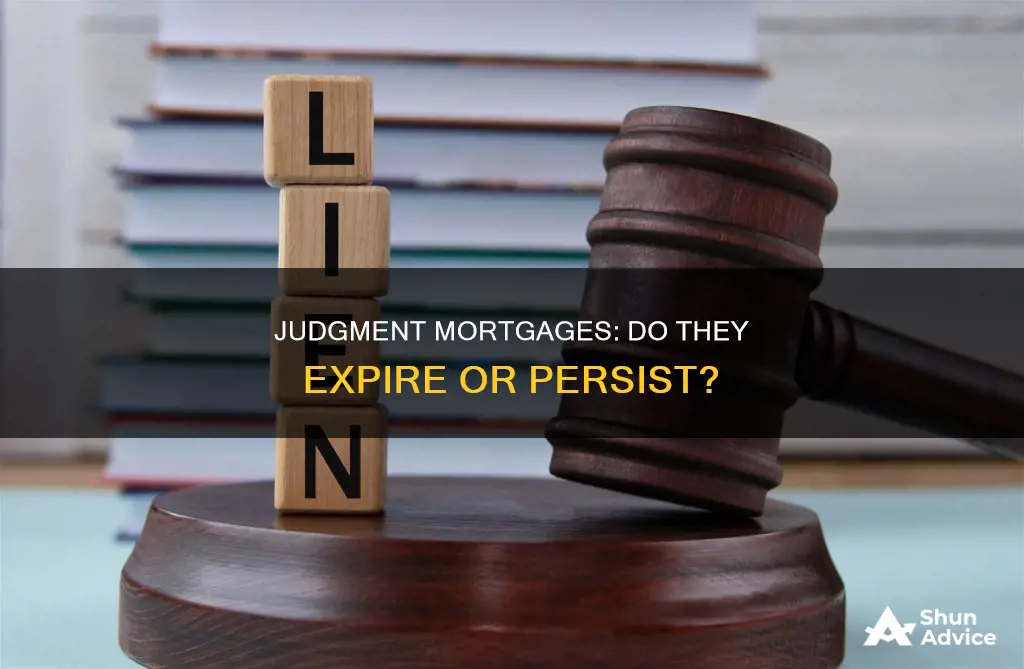
A judgement mortgage is a legal procedure that allows a creditor to secure repayment of a debt by placing a lien on the debtor's property. This process involves registering the judgement mortgage with the Property Registration Authority (PRA), which gives the creditor a legal claim to the debtor's property until the debt is repaid. The judgement mortgage remains valid until it is discharged, and there is no need to re-register it to maintain its validity. However, the question of whether a judgement mortgage expires after a certain period has been a subject of discussion. While some sources indicate a limitation period of 12 years, the courts have yet to provide a definitive ruling on this matter. Understanding the legal intricacies of judgement mortgages is essential for both debtors and creditors to protect their interests and make informed decisions.
Does a Judgement Mortgage Expire?
| Characteristics | Values |
|---|---|
| Expiry Date | 12 years from the date of the original judgement |
| Judgement Mortgagee | Creditor |
| Judgement Debtor | Debtor |
| Judgement Mortgage Validity | Remains valid until discharged |
| Judgement Mortgage Cancellation | Evidence of payment, affidavit in Form 57B, Rule 114 LR Rules 2012, Rule 72 or 101 Land Registry Rules 2012 |
| Judgement Mortgage Registration | LR Form 60 of the Land Registration Rules |
| Judgement Mortgagee Application | Order under section 31 to enforce a judgement mortgage in the case of co-owned land |
| Judgement Mortgage Order | Sale of the land and distribution of the proceeds of the sale |
What You'll Learn
- A judgement mortgage expires 12 years after the original judgement date
- A judgement mortgage can be cancelled from the register with evidence
- A creditor can apply to court to enforce a judgement mortgage
- A judgement mortgage is registered with the Property Registration Authority (PRA)
- A judgement mortgage does not create rights to land until it is registered

A judgement mortgage expires 12 years after the original judgement date
A judgement mortgage is a legal procedure that a creditor can use to secure a debt owed to them. It involves registering a charge against the debtor's property, which has a similar effect to taking out a mortgage. This process creates an interest in the debtor's land, giving the creditor the right to apply to a court for an order to enforce the judgement mortgage and potentially sell the land to recover the debt.
The specific laws and procedures surrounding judgement mortgages vary by region. For example, in Ireland, the Property Registration Authority (PRA) is responsible for handling judgement mortgages, and the Land and Conveyancing Law Reform Act 2009 updated the legislation regarding judgement mortgages registered after December 1, 2009. Additionally, in some cases, a judgement mortgage can be cancelled by providing evidence as outlined in the relevant rules and regulations.
It is always advisable to seek legal advice when dealing with judgement mortgages to ensure that the appropriate procedures are followed and that one's rights are protected. Each case is unique, and understanding the specific circumstances and applicable laws is crucial for making informed decisions.
If you are facing a judgement mortgage or seeking to enforce one, it is essential to be aware of the potential expiration date and to take appropriate actions within the timeframe allowed by law. Consulting with a legal professional can help clarify the options available and ensure compliance with the relevant regulations.
Fannie Mae Mortgage Note: Grace Period Explained
You may want to see also

A judgement mortgage can be cancelled from the register with evidence
A judgement mortgage is a legal procedure that a creditor can use to secure a debt owed by a debtor. It involves registering a charge against the debtor's property, which has a similar effect to taking out a mortgage. This means that the debtor must pay off the judgement mortgage when the property is sold.
A judgement mortgage can typically expire after a certain period, often 12 years from the date the judgement was obtained. After this period, the judgement mortgage can be cancelled from the register by providing evidence and following specific procedures.
To cancel a judgement mortgage from the register, evidence and relevant documentation must be provided to the Property Registration Authority (PRA). This typically includes an affidavit or Form 57B, along with receipts or evidence of payment, and an explanation of the circumstances. The PRA considers each application on a case-by-case basis and may require additional documentation or information.
It is important to note that the process of cancelling a judgement mortgage can be complex and may vary depending on the specific circumstances and the jurisdiction. Therefore, it is always advisable to seek legal advice and consult with a solicitor or a property team to guide you through the process and ensure compliance with the applicable laws and regulations.
HELOC and Mortgage: What's the Link?
You may want to see also

A creditor can apply to court to enforce a judgement mortgage
A judgement mortgage is a type of court order that allows a creditor to collect a debt from a debtor. If you owe money to a creditor and fail to pay, they can go to court and obtain a judgement mortgage against you. Once the court enters a judgement against you, the creditor becomes a "judgement creditor", and you become a ""judgement debtor".
Judgement creditors have a range of collection techniques available to them that are more extensive than those available to creditors who have not obtained a court judgement. Judgement creditors can apply to the court to enforce a judgement mortgage by attaching a judgement lien to a debtor's property. A judgement lien is a ""floating lien", which means it needs to be attached to a specific asset of the debtor. The judgement creditor must first identify the debtor's assets and then get the court's assistance in attaching the lien to that asset. Once the judgement lien is attached, the creditor can foreclose on the asset.
The type of property that a judgement lien can be attached to depends on the state, and the priority of the lien is determined by the order in which it was filed. For example, if a property is foreclosed, the first lien holder has priority over the proceeds of the sale and will be paid in full before any remaining proceeds go to the second mortgage holder, and so on. Judgement creditors can also apply to the court for a writ of execution, which allows them to instruct the sheriff or marshal to levy the debtor's personal property. Additionally, in some states, judgement creditors can obtain an assignment order to go after property that cannot be subjected to a levy, such as a tax refund or the loan value of unmatured life insurance.
It is important to note that judgement mortgages have a limitation period of 12 years from the date of the original judgement, after which they expire.
Cosigner Impact: Mortgage Approval and Beyond
You may want to see also

A judgement mortgage is registered with the Property Registration Authority (PRA)
A judgement mortgage is a court-ordered debt that is registered as a lien on a debtor's property. This means that the debtor has defaulted on their payments and the creditor has obtained a court order to take control of the property. The judgement mortgage is registered with the Property Registration Authority (PRA), which ensures that the creditor's interests are protected and that the debtor cannot sell the property without satisfying the debt.
The registration process for a judgement mortgage involves submitting the relevant documents, including the judgement mortgage document and prescribed particulars, to the PRA within a specified timeframe. This process creates a statutory mortgage over the debtor's interest in the lands concerned, giving the creditor certain rights and powers in relation to the property.
The PRA also plays a role in cancelling judgement mortgages. In some cases, a discharge may not be available even if the charge has been paid. In such situations, an affidavit in Form 57B can be lodged with the PRA, along with evidence of payment and an explanation for the lack of discharge. This process can help resolve issues with aged judgement mortgages that may pre-date other charges on the property.
It is important to note that a judgement mortgage has a limitation period of 12 years, after which it expires. This 12-year period starts from the date of the original judgement on which the judgement mortgage was obtained, not the date of the judgement mortgage itself. Once this period expires, the judgement mortgage is no longer valid, and the debtor may be able to regain control of their property.
Mortgage Dips: What's the Real Deal?
You may want to see also

A judgement mortgage does not create rights to land until it is registered
A judgement mortgage is a means by which a court order for money can be converted into a mortgage registered against a debtor's property. The creditor may register a charge against property owned by the debtor. The effect is the same as taking out a mortgage. The debtor has to pay off the judgement mortgage when the property is sold.
The registration of a judgement mortgage operates to transfer and vest in the creditor the unregistered lands referred to in the affidavit for all the estate rights and titles of the debtor in them at the time of registration, whether at law or in equity. It includes interest which the debtor might at such time create by virtue of any disposal power that they might have. In the case of a registered title, registration creates a charge. It is equivalent in certain respects to a registered charge granted to secure loan monies.
The 2009 Reforms simplified the formalities for the registration of a judgement mortgage. A judgement mortgage will have to be registered in the Companies Registration Office within 21 days. A judgement mortgage will be subject to a claim under the Family Home Protection Act, judicial separation, or divorce legislation. Registration of the judgement mortgage will not sever a joint tenancy. On the death of a joint owner subject to a judgement mortgage, the judgement mortgage will terminate.
The registration takes effect subject to existing registered burdens on the folio, section 72 burdens, and unregistered rights subject to which a judgement debtor held the interest at the time of registration. The creditor has the rights and remedies for enforcement as may be granted by order of the court. The unregistered rights did not include the interest of a purchaser under a sale contract who has not yet paid the full purchase monies. A judgement mortgage attaches to the beneficial interest of the vendor, which remains with them, even after they have received a deposit under the contract.
The limitation period in relation to any judgement mortgage is 12 years.
HOA Lien Foreclosure: Can It Wipe Out Your Mortgage?
You may want to see also
Frequently asked questions
A judgement mortgage remains valid until it is discharged. There is no need to re-register it to maintain its validity or enforceability. The limitation period in relation to any judgement mortgage is 12 years from the date of the original judgement on which the judgement mortgage was obtained.
A judgement mortgage is when a creditor registers a charge against property owned by a debtor. This has the same effect as taking out a mortgage. The debtor must pay off the judgement mortgage when the property is sold.
An affidavit in Form 57B can be lodged with the PRA (Property Registration Authority) with a receipt or evidence of payment and an explanation as to why the discharge cannot be obtained.







